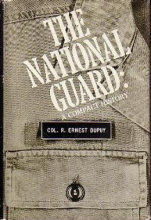
DUPUY : The National Guard (előszó)
This is the story of the National Guard, a military institution whose existence antedates the United States itself and which has taken part in all our wars.
The organized military, naval, and air power of the United States embraces the Regular United States Army, the United States Navy and Marine Corps (with their own air forces), and the United States Air Force. Supplementary to these establishments are our part-time warriors—the militia: National Guard, Naval Militia, and the Organized Reserve. On the right of the line, by seniority, is the National Guard, the original American militia. How did it originate and why has it become permanent? To be more specific, if—as has been loudly trumpeted by some through the years—this institution has proven itself to be unsatisfactory in the national defense, why not abolish it? If, on the other hand—as even more strident bugles blare—it has proven itself to be the salvation of the nation, why have also the Regular Army, Navy, Air Force, and Organized Reserve?
This conflict of opinion begins early, with the pros and cons both voiced by one man—the Father of His Country. General George Washington, in 1776, shortly after the disastrous Battle of Long Island, informed the Continental Congress: "To place any dependence upon militia is assuredly resting upon a broken staff. . . . If I was called upon to declare upon oath whether the militia had been most serviceable or hurtful, upon the whole I should subscribe to the latter. . . ."
Yet in 1783, as the War of the Revolution was drawing to its successful conclusion, Washington, responding to Alexander Hamilton's request that he give the Congress his views upon the infant nation's future military policy, flatly stated that one of the four essential factors in national defense must be: ". . . A well organized militia; upon a Plan that will pervade all the States, and introduce similarity in their Establishment, Maneuvers, Exercise and Arms."
This book is an attempt to resolve such a paradox.
Aside from pertinent references to battles won or lost in which the American citizen-soldier played a dominant role, one will find in these pages neither a history of our wars nor an apologia for the militiaman as compared with the Regular.
R. E. D.
Dunn Loring, Virginia